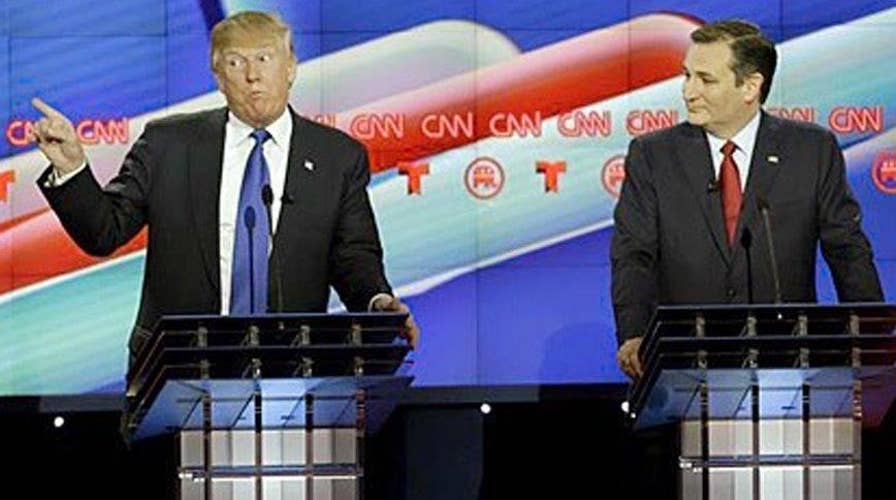Ted Cruz calls on rivals to drop out so he can take on Trump
Republican presidential candidate runs second in delegate race after winning home state of Texas
Donald Trump and Hillary Clinton each scored a string of impressive primary victories Tuesday night that sent an emphatic message to voters and their respective political rivals that the primary season might be all but over, and the race for the White House is on -- though Republican Sen. Ted Cruz, with victories in delegate-rich Texas and in Oklahoma and Alaska, is far from conceding anything.
Vermont Sen. Bernie Sanders, too, found reason to press on, with Super Tuesday wins in Minnesota, Oklahoma, Colorado and his home state of Vermont. Even Marco Rubio, after a string of second- and third-place finishes, found his first win in Minnesota.
But with Clinton amassing a huge delegate lead, the more competitive race is on the Republican side – where Cruz clearly edged Rubio in the Super Tuesday battle for second and quickly positioned himself as the better candidate to take on Trump.
“Tonight was another decision point, and the voters have spoken,” Cruz said in Texas, urging voters to unite behind him so he could take on Trump “head to head.”
Even with the senators' victories, Trump emerged from Tuesday’s contests closer than ever to the nomination, and acting more and more like a general election candidate eager to take on Democratic front-runner Clinton.
“Once we get all of this finished, I’m going to go after one person, and that’s Hillary Clinton,” he said, at an unusual primary night press conference in Florida. “I think that’s frankly going to be an easy race.”
Speaking in Florida after notching several wins, Clinton also seemed to look beyond Sanders – taking implicit shots at Trump’s “make America great again” campaign slogan.
“America never stopped being great,” Clinton said. “We have to make America whole.”
She also mocked his proposal for a southern border wall, saying, “Instead of building walls, we’re going to break down barriers.”
Trump answered right back, quipping: "Make America great again is going to be much better than making America whole again."
With results still coming in, Trump is projected to win in Alabama, Arkansas, Georgia, Massachusetts, Tennessee, Vermont and Virginia. Clinton is projected to win Alabama, Arkansas, Georgia, Massachusetts, Tennessee, Texas and Virginia.
Across 11 states, 595 Republican delegates were up for grabs Tuesday – nearly half the number needed to clinch the nomination. And on the Democratic side, Clinton and Vermont Sen. Sanders were battling for 865 delegates in 11 states – roughly a third of the number needed to clinch the nomination.
No matter how the delegate math shakes out, the primary races are not over – yet.
While the Super Tuesday contests marked the biggest day of primary season voting to date, the states were mostly allocating delegates proportionally, meaning even the runner-ups could add to their totals.
Rubio stressed that point, as he began to focus on the March 15 contest in his home state.
“We never said Super Tuesday was going to be our night,” he told Fox News.
Cruz clearly had the better night.
Texas was the biggest prize on the Super Tuesday map, offering 222 Democratic delegates and 155 Republican delegates. A win for Cruz in his home state was considered critical, and he was able to thwart any potential late-hour surge by Trump there.
While Cruz put subtle pressure on Rubio to step aside, Trump openly mocked the Florida senator after earlier calling on him to drop out – a call Rubio rebuffed. Trump again called him a "lightweight" while threatening to take on the Florida senator in his home state in two weeks.
Clinton entered Super Tuesday with a head of steam following her landslide win over Sanders in South Carolina this past Saturday.
Sanders, though, savored his home-state win all the same, rallying cheering supporters in Vermont Tuesday evening.
"It is good to be home," he said, before shifting to his stump speech slams against a "corrupt campaign finance system."
Ohio Gov. John Kasich, who expressed low expectations for Super Tuesday, remains in the GOP race in hopes of making it to the Ohio contest in two weeks, though his presence continues to frustrate efforts by Rubio and Cruz to consolidate support.
Retired neurosurgeon Ben Carson, meanwhile, has defended his continued presence in the race.
“People have asked for somebody who is not a politician, who was a member of we the people, who has an outstanding life of achievement and who thinks the way they do,” he told Fox News.












































